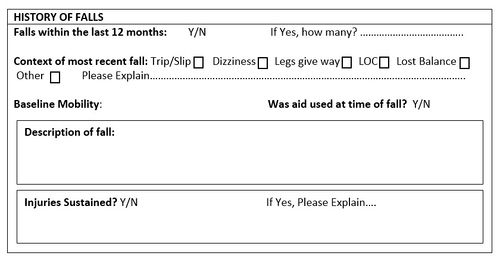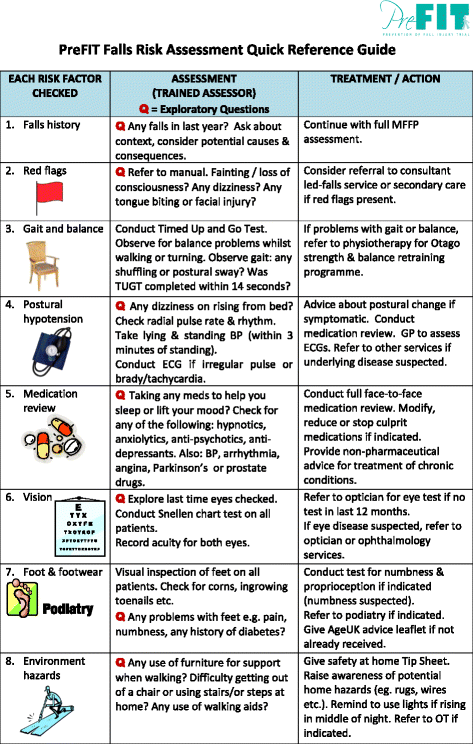About Dementia Fall Risk
Table of ContentsUnknown Facts About Dementia Fall RiskHow Dementia Fall Risk can Save You Time, Stress, and Money.What Does Dementia Fall Risk Do?Not known Facts About Dementia Fall RiskThe Single Strategy To Use For Dementia Fall Risk
The FRAT has three sections: fall danger standing, threat aspect list, and action plan. A Fall Danger Standing consists of information concerning history of current falls, medications, emotional and cognitive condition of the person - Dementia Fall Risk.If the patient scores on a threat element, the matching number of factors are counted to the patient's autumn danger score in the box to the much appropriate. If a client's autumn risk score totals five or higher, the person is at high risk for drops. If the patient scores just 4 factors or reduced, they are still at some danger of dropping, and the nurse ought to use their best medical assessment to manage all fall danger elements as part of a holistic treatment strategy.
These conventional techniques, generally, aid develop a secure atmosphere that reduces unexpected falls and delineates core preventative steps for all clients. Indicators are crucial for patients at threat for falls. Doctor require to acknowledge that has the condition, for they are in charge of applying actions to advertise patient safety and security and protect against falls.
The Dementia Fall Risk PDFs
Wristbands must consist of the person's last and first name, date of birth, and NHS number in the UK. Details should be printed/written in black against a white background. Only red color should be used to signal special client status. These recommendations are constant with current developments in client identification (Sevdalis et al., 2009).
Items that are too far may call for the person to connect or ambulate unnecessarily and can possibly be a threat or add to falls. Helps prevent the patient from heading out of bed with no help. Nurses react to fallers' telephone call lights more promptly than they do to lights started by non-fallers.
Visual problems can greatly create falls. Hip pads, when worn properly, may decrease a hip crack when autumn happens. Maintaining the beds closer to the floor reduces the threat of falls and serious injury. Positioning the mattress on the flooring substantially decreases loss danger in some medical care setups. Low beds are made to reduce the range a client drops after moving out of bed.
Getting My Dementia Fall Risk To Work
People who are tall and with weak leg muscle mass who try to rest on the bed from a standing setting are most likely to fall onto the bed since it's also reduced for them to lower themselves safely. Additionally, if a high patient attempts to rise from a low bed without help, the patient is likely to fall back down onto the bed or miss the bed and go to this web-site fall onto the flooring.
They're developed to promote timely rescue, not to protect against drops from bed. Apart from bed alarm systems, boosted supervision for high-risk people additionally might aid stop falls.

Individuals with a shuffling stride increase autumn possibilities dramatically. To reduce autumn risk, footwear ought to be with a little to no heel, thin soles with slip-resistant walk, and support the ankle joints. Recommend person to use nonskid socks to stop the feet from sliding upon standing. Nevertheless, encourage people to wear appropriate, well-fitting shoesnot nonskid socks for ambulation.
What Does Dementia Fall Risk Do?
In a research study, homes with ample lighting report fewer falls (Ramulu et al., 2021). Renovation in illumination at home might decrease fall prices in older grownups.

Caretakers are effective for guaranteeing a safe and secure, secured, and risk-free atmosphere. However, studies showed extremely low-certainty proof that sitters reduce fall danger in severe care health centers and only moderate-certainty that options like video clip monitoring can minimize sitter use without increasing loss danger, recommending that sitters are not as helpful as initially thought (Greely et al., 2020).
Some Of Dementia Fall Risk

Increased physical fitness decreases the risk for falls and restricts injury that is sustained when loss transpires. Land and water-based workout programs may be in a similar way useful on equilibrium and gait and therefore decrease the threat for falls. Water workout might add a favorable advantage on balance and stride for women 65 years and older.
Chair Rise Workout is a basic sit-to-stand workout that helps reinforce the muscles in the thighs and butts and improves wheelchair and independence. The goal is to do Chair Surge workouts without using hands as the customer comes to be stronger. See resources area for a detailed instruction on exactly how to execute Chair Rise exercise.